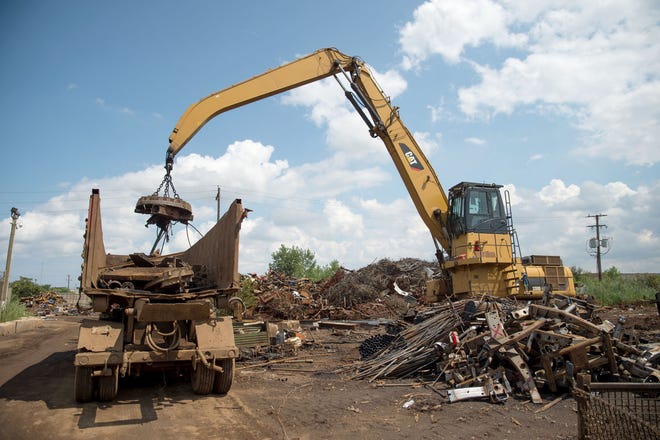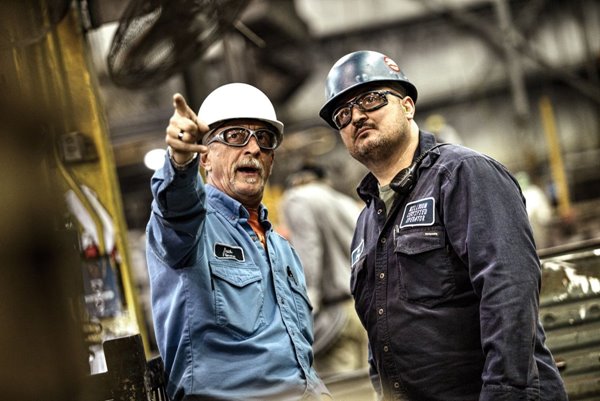It's hard to imagine that a trade war could turn into a scrap yard fight in Detroit.
So when China slapped retaliatory tariffs on aluminum waste and scrap in April, recycling operations, including two deeply-rooted, family-owned businesses in Michigan, found themselves on the front lines of the trade war.
It's not an esoteric economic shift that will only hit a few guys running scrap metal outfits across the country. Consumers who haul stuff out of basements, backyards and garages hoping to make a few bucks by scrapping already are seeing far less money in return for junk.
Some say the payout for someone who wants to junk an old car has dropped by 30 percent in some areas.
Manufacturers will see their costs go up too as they're already receiving less money for the castoffs generated during assorted production processes, such as making parts for automakers.
After the April hit, China went a step further and put 25 percent tariffs on $16 billion of U.S. products effective Aug. 23 — including all scrap commodities, such as copper, nickel, and stainless steel.
Michigan has about $1 billion in total exports for products to China at risk because of new tariffs, according to the latest data from the U.S. Chamber of Commerce. The total includes some agriculture products, such as some vegetables, dairy, tomatoes, and beans.
While many Michigan farmers are caught in the trade war turmoil, the top three Michigan exports to China impacted by the trade war are industrial products.
The biggest hit to Michigan right now involves retaliatory tariffs by China on passenger vehicles, putting $482 million exports out of Michigan at risk.
Exports of gear boxes for motor vehicles out of Michigan to China puts $249.6 million at risk in the trade war. Lubricating preparations, not containing petroleum oils, now ranks No. 3 with $28 million at risk.
But at least $24.3 million in aluminum waste and scrap exports to China from Michigan are at risk after the tariffs, according to the U.S. Chamber of Commerce.
Detroit scrap yard that clears out metals from auto suppliers sees drop in prices

Driving across more rugged parts of Detroit and its suburbs, you'll spot small, grungy outfits dedicated to recycling metal, an economic necessity for dealing with costly leftover materials from the vast auto manufacturing process.
Manufacturers across the state — including auto suppliers and makers of office furniture — are dealing with raw materials, finished products and discarded materials. Think of things like castoffs from the sheet metal used to make a new car door panel heading to recycling facility.
Big Kimmel Scrap Iron & Metal Company trucks, for example, haul the scrap materials out of area factories run by auto suppliers and others to the 20-acre, Kimmel yard on Grand River, near I-96, on the city's west side.
It's strictly a business-to-business operation — no goods are accepted from individual scrappers who might be clearing out garages, or worse yet, trying to unload stolen catalytic converters or road signs.
Kimmel Scrap Iron & Metal Co., which has $20 million in revenues, has been in Detroit since 1950. It has 16 employees, plus three outside contract employees.
Ben Kimmel, Robert's grandfather, started the company in 1930 in Iowa City, Iowa. His son Morris and his wife, Ruth, moved to Detroit and started the business here with one truck.
The company buys scrap from industrial manufacturers in the automotive and defense industries, as well as demolition projects across Michigan.
The scrap is sorted by size, type and chemistry. The materials are later sent via rail car or trucks to steel mills and other locations through the Midwest and elsewhere in the United States.
"All of our raw material is processed on site or sold for final recycling at domestic or foreign mills," Kimmel said.
He noted that his business is already experiencing extremely quick price reductions from domestic steel and aluminum mills and foundries, where his company sells recycled metals it buys.
Kimmel says his business won't be dealing directly with higher tariffs, as he doesn't export to China. But he expects that his profits will be reduced, as prices to keep going down for aluminum, copper, stainless steel.
American-made goods, of course, typically become more expensive overseas when retaliatory tariffs are imposed by China, Canada and other countries on U.S. exports.
"As tariffs have impacted foreign consumption of our exports, we now have an oversupply domestically of both steel, aluminum and stainless scrap," Kimmel said.
It's an issue that the industry is closely watching.
"If customers in China hesitate to pay the extra 25 percent charge, they will try to source material from companies in other countries," said Adina Renee Adler of the Washington-based Institute of Scrap Recycling Industries.

"Thus, U.S. recyclers lose the business," she said.
Right now, industry experts say no other country or group of countries can pick up that slack from China.
Lower profits would mean that scrap recycling companies would be less likely to reinvest in operations, expand, buy more material to process and hire workers, according to industry experts.
The recycling market has long had to deal with the ups and downs of the economy, as well as fluctuating industrial demand in China. Scrap prices, of course, plunged after the financial meltdown in 2008-09. Some recycling operations went out of business or went bankrupt.
The Institute of Scrap Recycling Industries voiced its concerns about the trade war by sending a letter to U.S. Commerce Secretary Wilbur Ross and U.S. Trade Representative Robert Lighthizer to warn of the "economic costs — not benefits" as a result of the tariffs.
In June, the Trump administration imposed a 25 percent tariff on imports of steel and a 10 percent tariff on imports of aluminum. But China imposed retaliatory tariffs even before then, which impacted the scrap metal industry. More tariffs hit the industry Aug. 23.
Steel-consuming companies, of course, find the costs of their raw materials going up. U.S. steel prices have jumped by more than 50 percent since January in anticipation of tariffs.
At the same time, auto suppliers and other manufacturers who recycle excess metal are being hit by lower prices when they want to recoup some of those costs by recycling the byproduct. It could be the trimming from making a file cabinet door or part for a car or truck.
Charles Ballard, a professor of economics at Michigan State University, said an often misunderstood part of the trade war involves how businesses here are hit by tariffs that other countries imposed in retaliation.
"Lots of Michigan companies use steel and aluminum," Ballard said."We have the auto companies, as well as companies that do various kinds of metal fabrication. All of these companies are put into a squeeze."
"Of course, they would be tempted to pass the price increases along in terms of higher prices for their own products, but market competition will put limits on their ability to raise prices."
Even Trump supporters, such as Kimmel, acknowledge that a resolution in the trade war might not be reached as soon as some might expect.
"President Trump believes we've been stepped on for a long time," said Kimmel, who agrees with that stance."I support my president for what he's doing. I'm a little bit worried how he's going about it," Kimmel said. "It's a little bit too much hammer and not enough carrot."
Kimmel expects that the United States could face higher inflation and rising prices, as a result of the trade war, as costs are passed onto consumers.
Holland yard that crushes old cars and makes scrap-metal sculptures sees China buying less

Talk of the trade war — and worries about how much it might hurt the U.S. economy — oddly enough put Michigan's scrap operators in the national spotlight.
Jeff Padnos, who is co-owner and chairman of a much larger recycling operation based in Western Michigan, even popped up on NPR in late June to talk about scrap. Back in late June, Padnos told public radio audiences that early trade retaliation was so swift that there were recycling materials already on the water that couldn't be diverted and some shipments stacked up in the Chinese ports.
Since then, the dock situation has been resolved. But Padnos said last week that the issue of who will pay some of the costs associated with those extensive delays still remains to be worked out.
The Padnos company — founded in 1905 by Jeff Padnos' grandfather Louis Padnos — employs about 600 people at 18 locations throughout Michigan and Indiana. It accepts goods to recycle in cities such as Lansing, Traverse City, Ludington, Grand Rapids and Alma.
It recycles metal, paper, plastics and electronics. His nephew, Jonathan Padnos, is the family-company's president.

The recycled materials can come from scrap materials that result in the production of office furniture in the Grand Rapids area. The metal also comes from obsolete machinery and equipment such as autos, railroad cars, railroad tracks, home appliances and demolition metal from buildings and other obsolete structures.
An old school bus was hauled into the Holland yard recently. Padnos said they're holding onto that one for a while, waiting to demolish it perhaps during a school tour when the students might really enjoy that one.
The recycling operation will shred up the vehicle and sort out the different metals in it that can be recycled.
Earlier in August, Padnos formed a strategic partnership with Roseville-based GLR Advanced Recycling, with Padnos acquiring a significant interest in another family-owned recycling business. The partnership is designed to take advantage of economies of scale and processing capabilities.
If you've visited Holland — about a two and a half hour drive out of Detroit — you might even remember seeing the Padnos operations driving along Pine Avenue near Lake Macatawa. You're not quite sure where to look first — the mountains of scrap or the magnificent outdoor sculptures.
Stuart Padnos, Jeff's father who passed away at age 90 in 2012, found artistic inspiration in scrap metal. His work, including a "Marching Band" and another involving two large "Tulips," is found at the Frederick Meijer Gardens and Sculpture Park.
Jeff Padnos, 69, said recycling is a key part of manufacturing, as well as global trade.
"Our whole mission is to avoid throwing things away and making sure it gets used," Padnos said.
A lot of money, of course, can be made in that mission if trade remains open for worldwide commodities.
Much is at risk if Michigan manufacturers lose orders, Padnos noted. As the price of steel goes up, some U.S. manufacturers might not be able to pass along higher prices and could lose sales if they're not competitive.
Padnos would not disclose annual sales for the family-owned company but sales have been estimated in the past to exceed $300 million.
The U.S. recycling industry trade group reports that the United States exported a total of $5.6 billion worth of scrap commodities to China — including paper, plastics, as well as metals in 2017. But the industry already was looking at a 24-percent decline in the first six months of 2018, compared to the same time a year ago.
China also has tightened standards on accepting for waste plastics, paper and other recycled materials from the United States.
Padnos, like others, questions how anyone can think a trade war is easy to win.
He's concerned about the bluster and the risk that things could get out of control.
"I hope we don't think we can insult our way to a solution," Padnos said.
He said China amounted to about 60 percent of the company's metal exports — and that market is essentially gone.
Even so, he's anticipating that his recycling operations will be able to adjust. He goes out of his way to note that he's concerned about Michigan's farmers, too, who may find it far harder to deal with some of the trade-related slump.
He remains hopeful that things eventually will calm down.
"Nobody's lost a job here. Nobody will lose a job here. We have to find other markets," Padnos said.
While there's a case to be made for free and fair trade, Padnos said he expects much uncertainty ahead as trade discussions continue.
U.S. and Chinese negotiators began two-days of talks in Washington last week, which many expected could set the stage for further negotiations. Trump and Chinese leader Xi Jinping are to meet at multilateral summits in Argentina at the end of November.
"Both sides need this trade," Padnos said.


